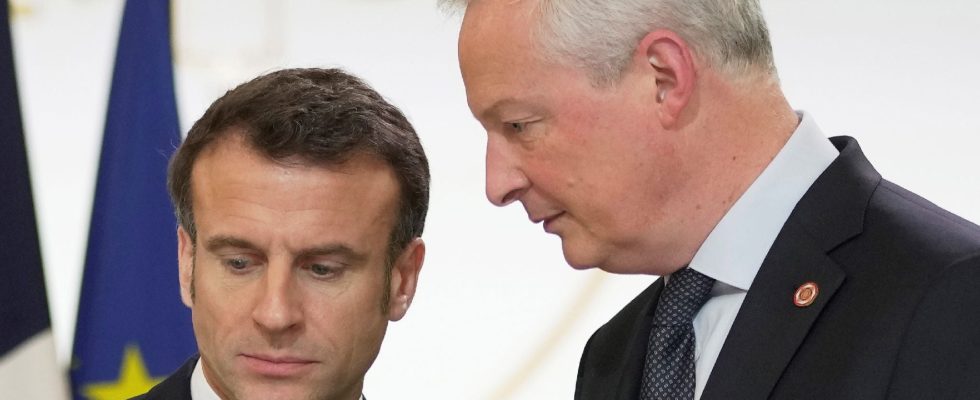He wants to avoid fueling a trial of budgetary “incompetence” initiated by the oppositions. Emmanuel Macron held meetings on Wednesday March 20 at the Elysée on the slippage of the public deficit which threatens France’s credibility on the markets.
INSEE will deliver its verdict on March 26, but the figures are not good and the government knows it: the public deficit will be “higher than 5%” of GDP in 2023, a level “higher” than the objective of 4 .9% which had been set by the government, indicated Thursday the Minister Delegate in charge of Public Accounts Thomas Cazenave. The minister, who invoked a “new economic context” to explain this slippage, however refused to confirm press information on franceinfo according to which the executive would now expect a deficit of around 5.6% of GDP .
According to the newspaper The echoes, the government now fears a public deficit which would widen to 5.6% of GDP for 2023. Le Figaro cites a source according to which it would reach 5.5% with a margin of error of 0.3 points.
A long dinner that looks like a crisis meeting
The president invited the leaders of the parties and parliamentary groups that make up his majority on Wednesday evening for a long dinner resembling a crisis meeting. “We have to face a cyclical economic shock linked in particular to geopolitics. We assume and we tell the truth to the French,” he declared to his hosts, according to one of them, adding that France was escaping to recession, unlike many of its neighbors.
Previously, Emmanuel Macron had received Bruno Le Maire at the end of the day, as well as the ministers responsible for local authorities and social affairs, Christophe Béchu and Catherine Vautrin. The opportunity to put certain avenues already put forward by the executive back on the table, in particular to curb unemployment insurance and health spending.
The government will consult all stakeholders in public spending, the head of state told his majority leaders, according to a participant. But Emmanuel Macron seemed to rule out the possibility of presenting a draft amending budget in the coming months, a risky approach when he only has a relative majority in the National Assembly and could expose himself to a vote of censure. .
A month after announcing 10 billion euros in savings, Bruno Le Maire once again put his foot in the problem on Sunday, proposing to “replace the welfare state with the protective state”, because “free everything, for everyone, all the time” is “untenable”. Initiative which annoyed the head of state: “He should talk about it to the one who has been Minister of the Economy for seven years,” mocked Emmanuel Macron, according to The chained Duck. Comments confirmed to AFP by someone familiar with the Palace.
Some MPs are calling for increasing taxes on the “ultra-rich” or large businesses, including the head of the MoDem group Jean-Paul Mattei. But the government refuses to touch the tax lever.
Rating agencies
At the very least, it will be necessary to give guarantees before the ax of the rating agencies: Fitch and Moody’s on April 26, and especially S & P on May 31. A downgrade of France’s rating could lead to an increase in the interest rates at which the government refinances on the markets and make debt management more difficult.
As the campaign for the European elections on June 9 begins, the oppositions denounce this slippage in public finances which, according to them, can only be attributed to the deterioration of the economic situation. “We have never had such appalling figures,” said the president of the National Rally deputies, Marine Le Pen, castigating the “pitiful results” and “the incompetence of this government in the financial field”.
Same accusations from the left of the deputy La France insoumise Adrien Quatennens: “These people are poor economists” who “have increased the deficit and the debt to always give gifts to the same people” and “do not have to give lessons to the French”, he castigated on CNews and Europe 1.
The president of the Republican party, Eric Ciotti, for his part denounced the “dramatic situation” of French public finances, assuring that the country “is taking the same path as Greece”, whose economy collapsed at the start of the 2010s under the weight of unsustainable debt.
“Highlights in the media are good. But being consistent in the debates in the National Assembly is perhaps better,” replied government spokesperson Prisca Thevenot to the from the council of ministers, accusing LR of multiplying “proposals” which “go in the direction of increasing state spending”.
